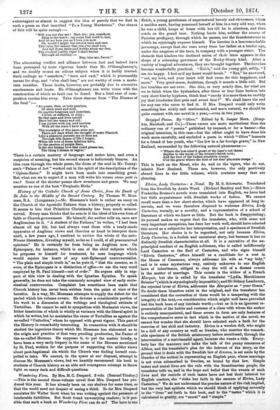Elvira, Lady Casterton : a Novel. By M. S. Schwartz.
Translated from the Swedish by Annie Wood. (Richard Bentley and Son.)—Since Frederika Bremer's novels were translated into English, we have had but little acquaintance with Swedish works of fiction. We cannot recall more than a few short stories, which have appeared at long in- tervals, and we were therefore disposed to welcome Elvira, Lady Casterton, warmly, as a novelty, and a representative of a school of literature of which we know so little. But the book is disappointing ; its perusal makes us regret that the translator, who, with some not very important exceptions, has done her work well, should have selected this novel as a subject for her interpretation, and a specimen of Swedish literature. Her choice is to be regretted, not only because Elvira, Lady Casterton, is a foolish and unnatural story, but because it has no distinctly Swedish characteristics at all. It is a narrative of the un- principled conduct of an English nobleman, who is called indifferently 'Lord Casterton or the Earl of Casterton, and who signs himself "Edwin Casterton," offers himself as a candidate for a seat in the House of Commons, always addresses his wife as "my lady," and is in some mysterious way, entirely unknown to our English laws of inheritance, obliged to obey the will of a distant cousin in the matter of marriage. This cousin is the widow of a French Marquis, but she is called by the translator "Lydia, Marchioness Brissier" (which is etymologically impossible); and Sir Sidney Lembonrn, the rejected lover of Elvira, addresses the Marquise as "your Grace." No doubt these blunders exist in the original, and the translator has considered that the correction of them would be a tampering with the integrity of the text,—a consideration which might well have prevailed had the book been of any intrinsic worth ;—but as it is an ignorant re- presentation of the habits and customs of a class with whom the author is entirely unacquainted, and these errors in form are only features of the comprehensive error in fact which is the motive of the novel, we cannot but wonder that she should have selected such a book for the exercise of her skill and industry. Elvira is a wooden doll, who might be a doll of any country as well as Sweden, who marries the remark- able specimen of the British aristocracy before mentioned, through the intervention of a matrimonial agent, because she wants a title. Every- body has the manners and talks the talk of the penny romances of Albion, and the translator's plea for the interest of the story, on the ground that it deals with the Swedish law of divorce, is set aside by the blunder of the author in representing an English peer, whose marriage is not even solemnised in Sweden, as bound by that law. Simple tastes and moral lives are the rule with the Scandinavian people, the translator tells us, and in the hope and belief that the events of such lives and the records of such tastes have not lost their interest for English readers, she "risks her faith in the success of Elvira, Lady Casterton." We do not understand the precise nature of the risk implied, but the very last epithets which we should think of applying severally to the " lives " set forth in this book, and to the " tastes " which it is calculated to gratify, are "moral" and "simple."






































 Previous page
Previous page